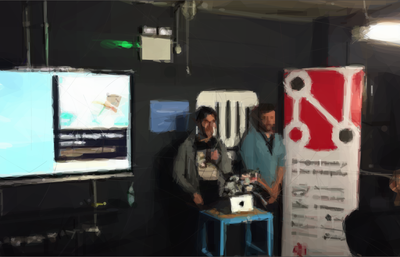Articles from the blog (Page 5 of 8)

My Universal JavaScript Web Applications talk at Codemotion Rome 2017
The author gave a talk on building universal JavaScript web apps at Codemotion Rome 2017. He updated his Judo Heroes demo to v2 with React 15.4, React Router 4, Webpack 2, and Express 5. The talk got positive feedback from the audience. Slides and video are linked.

Unshorten (expand) short URLs with Node.js
This article explains how short URLs work and provides code examples to expand them in Node.js using request module or tall library. It covers basics of URL redirection, shows how to disable auto-redirect in request module, and introduces tall - a promise-based Node.js library to unshorten URLs.

My Serverless & AWS Lambda talk at Node.js Dublin January 2017
This post summarizes a talk about building a serverless architecture on AWS Lambda using the Serverless framework. It covers topics like authentication, authorization, testing, CI/CD, and cost monitoring. The presenters share lessons learned from real-world experience building a production serverless application.

2016 - A year in review
A personal review of 2016 highlights career growth through a new job, open source contributions, conference talks, and co-authoring a Node.js book. The post also covers learning new technologies like Elixir and AWS, while noting failures like lack of focus on a side project.

My Universal JavaScript Web Applications talk at Codemotion Milan 2016
This blog post summarizes a talk about building a Universal JavaScript application with React given at Codemotion Milan 2016. It includes commentary for each slide, photos from Twitter, and a video recording. The post explains what Universal JavaScript is, its benefits, challenges, and walks through demo code to add server-side rendering and routing to a React app.

How to crack a JWT token: two articles about distributed computing, ZeroMQ & Node.js
This blog post explains how to build a distributed application using Node.js and ZeroMQ that cracks JWT tokens. It provides a step-by-step guide on implementing the application and links to two in-depth articles on RisingStack that cover the theory and coding details.

Two Interviews about Node.js, JavaScript and being a book author
Luciano Mammino recently participated in two interviews discussing his work with Node.js and JavaScript as well as his experience as an author writing books about Node.js design patterns.

React on the Server for Beginners: Build a Universal React and Node App
This article explains how to build a simple Universal JavaScript application using React, React Router and Express. It shows how to implement server side rendering with React and Node.js to create an isomorphic app.

Extracting data from Wikipedia using curl, grep, cut and other shell commands
By using a combination of curl, grep, cut, sort, uniq and other common bash utilities it is possible to extract structured data from Wikipedia and compute insights without writing a full program.

Announcing the book "Node.js design patterns - second edition"
The author announces the release of "Node.js design patterns - second edition", a new book covering design patterns for Node.js and JavaScript. It includes updated code for Node v6 and ES2015 across 11 chapters and 100+ examples.